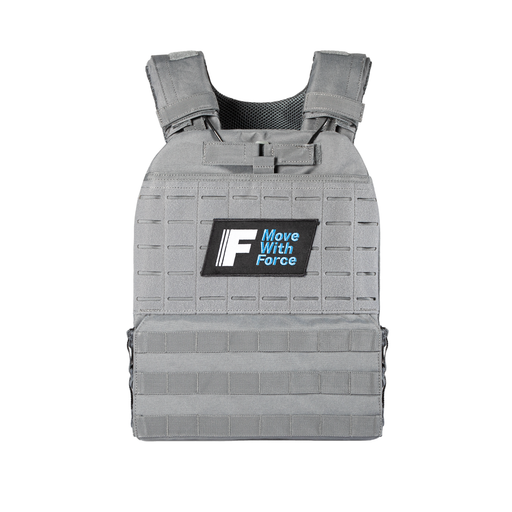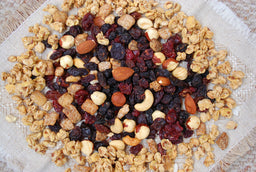
Can Rucking Boost Testosterone? Here’s What the Science Actually Says
If you’ve been getting into rucking lately, whether you’re strapping on a weighted vest, loading up a weighted backpack, or just hiking harder than the average weekend stroller, you might have wondered “Can this actually boost my testosterone?”
It’s a fair question. After all, testosterone is tied to strength, energy, muscle mass, recovery, basically everything we care about when it comes to training and feeling good.
Here’s the honest truth: There isn’t yet a scientific study that directly measures testosterone levels during rucking. But, and this is important, there is a mountain of research showing that the types of stress rucking creates do increase testosterone. So while we don’t have a “rucking-only” study, we do have plenty of evidence pointing in the same direction.
Let’s walk through it together...or actually, let's ruck through it together.
What We Know: The Exercise–Testosterone Link
First things first: we know for a fact that both resistance training and endurance exercise cause spikes in testosterone. That’s not speculation. That’s well-documented. One of the landmark papers on the topic, a 2010 review by Vingren and colleagues in Sports Medicine, puts it plainly:
“Acute resistance exercise increases serum testosterone concentrations in men.”
So when you lift weights, row hard, sprint, or push through a tough loaded workout, your body releases a temporary surge of testosterone. This is one of the reasons strength training is so good for long-term hormonal health.
Interestingly, endurance exercise isn’t far behind. A 1991 study in the European Journal of Applied Physiology found that endurance training triggered a ~37% increase in testosterone, even more than strength training in that specific test.
Why does this matter? Because rucking sits right in the sweet spot between resistance and endurance training. It’s load-bearing cardio. It’s hiking with purpose. It’s carrying extra weight over mixed terrain.
In other words it mimics the exact conditions shown to boost testosterone.
Where Does the Weighted Vest or Weighted Backpack Fit In?
This is where things get really interesting. A weighted vest doesn’t load your body the same way a weighted backpack does — and that’s a good thing, because the different load placements change the muscles you use.
A 2018 study in the Journal of Sports Science & Medicine looked at how the body responds to torso-loaded vs. back-loaded weight. They found that a weighted vest tends to make your legs, core, and hips work harder, while a backpack puts more emphasis on your shoulders, upper back, and spinal stabilisers.
Why is that relevant? Because the more total muscle mass you recruit, the stronger the hormonal response tends to be. Rucking with a weighted vest or weighted backpack checks this box spectacularly.
Even without a direct rucking-specific study, the mechanism is the same: You’re doing more work, burning more energy, recruiting more muscle, creating more metabolic stress and prompting a hormonal response.
The pieces fit together nicely.
So… Will Rucking Increase Testosterone?
The most accurate answer is: Probably yes, at least acutely and all the evidence points that way but no study has directly measured it yet.
Rucking mimics:
-
strength training (because of the load)
-
endurance training (because of the duration)
-
natural movement (which is great for hormones)
It also uses large muscle groups; legs, glutes, core, hips, traps, back and this is exactly what testosterone responds to.
And here’s something people often forget: Testosterone isn’t just boosted by what you do in the gym. It’s boosted by anything that challenges your body meaningfully without tipping you into exhaustion or overtraining.
Rucking fits this profile perfectly. It’s tough but doable. Heavy but not punishing. Hard enough to stimulate change without crushing your CNS or joints. That’s probably why so many people report feeling stronger, more energetic, and more resilient after a few months of consistent rucking.
How to Ruck in a Testosterone-Friendly Way
If your goal is to support testosterone, not accidentally suppress it, here’s the recipe:
-
Use 10–25% of your bodyweight - Light loads won’t do much. Very heavy loads will fry you. A weighted vest is perfect for even weight distribution, while a weighted backpack hits the upper back harder.
-
Choose hills or mixed terrains - Elevation = more leg drive = more muscle activation = more stimulus.
-
Aim for 30–90 minutes - Long enough to challenge you, short enough to avoid the testosterone-crushing effects of extreme endurance.
-
Recover properly - This includes sleep, nutrition, hydration, all of which have bigger impacts on your hormones than any workout ever will.
-
Don’t overdo it - Rucking every day at high volume won’t help, it’ll tank your hormones. Two to four sessions per week is the sweet spot.
Think of rucking like strength training with a scenic view and less risk of injury.
A Simple Weekly Ruck Plan That Supports Hormonal Health
If you want something ready-made, here’s a balanced weekly structure:
Monday – Weighted Vest Ruck: 45–60 minutes, hills if possible.
Wednesday – Weighted Backpack Ruck: 60 minutes, mixed terrain.
Friday – Fast Ruck (No Weight): Quick pace, 30–45 minutes.
Weekend – Optional Longer Vest Ruck: Easy pace, 60–90 minutes.
This gives you load variation, muscle variation, and plenty of recovery — all things testosterone thrives on.
The Bottom Line
We don’t yet have a study that takes people, puts them in a weighted vest or weighted backpack, sends them out for a ruck, and then measures their testosterone levels before and after.
But everything we do know, from resistance training research, to endurance research, to studies on load carriage and muscle activation, suggests that rucking is absolutely the kind of activity that can support testosterone production, especially in the short term.
It’s tough.
It’s physical.
It recruits lots of muscle.
It blends strength and cardio.
And most importantly: it’s sustainable. So yes, rucking with a weighted vest or weighted backpack is almost certainly beneficial for testosterone — and even if future studies refine that claim, there’s no question that rucking will make you stronger, fitter, leaner, and more resilient.
That’s a win in every direction.

















